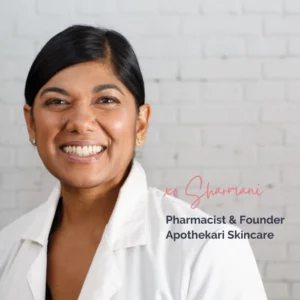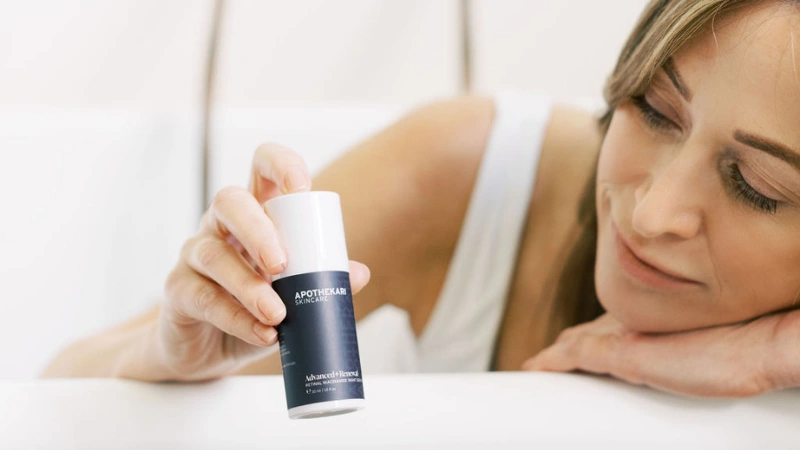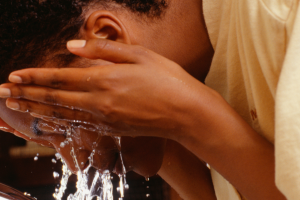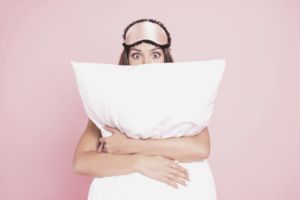You may be wondering if retinol (or another retinoid) has a place in your skin care routine.
In this post we’ll explain why it’s important if you’re serious about healthy and beautiful skin. And, we’ll show you how to get this superstar ingredient into your life.
What is Retinol?
Retinol is a form of vitamin A that you can find in skincare serums, creams and lotions, especially those marketed as “anti-aging”. Which is NOT a term we like to use around here, but which persists, nonetheless. (It’s why we’ve recently renamed our A is for Anti-Aging Serum to Advanced+ Renewal).
It belongs to a class of ingredients know as retinoids, which are known for their ability to improve the appearance of fine lines, wrinkles, and uneven skin texture. And they’ve also been shown to be useful in the management of acne. Retinol may be the most well-known retinoid, but there are several others also used in skincare.
- Retinyl palmitate & Retinyl acetate. Very mild and gentle and available without prescription
- Retinaldehyde. Potent, but still gentle and found in our Advanced+ Renewal Serum. Available over the counter.
- Adapalene. Prescription only.
- Tazarotene. Prescription only.
- Tretinoin. Prescription only.
- Isotretinoin. Prescription only.
Prescription forms tend to be stronger, and often more irritating to skin. If you feel you’re ready for one, your physician will be able to guide you towards the best option for your individual needs.
What is Retinol Good For?
As a class of ingredients in general, retinoids:
- Increase collagen production and decrease its breakdown, which minimize the appearance of fine lines and wrinkles along with scarring.
- Inhibit the production and transfer of melanin (skin pigment), which “prevents age spots from worsening and also helps to fade existing dark spots.
- Help unclog pores and minimize their appearance.
- Increase skin cell turnover, which helps replace old, dry, dead skin cells with younger, healthier ones. The result is that glow that we’re all after.
- Reduce transepidermal water loss, leaving skin looking more plump and hydrated.
Retinol helps to improve the appearance and texture of skin. It diminishes the appearance of wrinkles and fine lines, smooths skin, fades age spots and hyperpigmentation and minimizes acne blemishes, so it’s a powerhouse ingredient to have in your skin care arsenal.
Keep in mind that while retinol may be the most well known retinoid, that it’s not necessarily the best one. As effective as it is, it does come with some effects.
What are the Negative Effects of Retinol?
Retinol can result in some negative side effects, especially if it isn’t used correctly. Common side effects include redness, peeling, and dryness, which can be really disheartening when you start using it on a regular basis. Boo.
Another way to minimize retinoid side effects is to start with a low concentration and gradually work your way up to a higher concentration. It’s also important to use retinol in combination with a good moisturizer and/or face oil to help prevent dryness and irritation.
However, despite following good instructions on retinol use, you may still find your skin unable to tolerate it. In this case, you can opt for a more gentle retinoid, like retinaldehyde.
Retinol vs Retinaldehyde
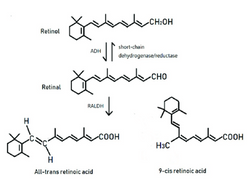 Retinaldehyde—often simply called retinal—is retinol’s gentler, yet even more powerful cousin. And we’re BIG fans of this ingredient at Apothekari, which is why it’s included in our Advanced+ Renewal Serum, along with other actives. Retinal is also one step closer than retinol in converting to retinoic acid, making it more readily available for your skin to put it to good use. And, just like retinol, studies have shown that it minimizes the appearance of dark spots, fine lines and post-acne scarring. The kicker? It works just as well (possibly better than retinol), and with fewer side effects. It should be on everyone’s radar!
Retinaldehyde—often simply called retinal—is retinol’s gentler, yet even more powerful cousin. And we’re BIG fans of this ingredient at Apothekari, which is why it’s included in our Advanced+ Renewal Serum, along with other actives. Retinal is also one step closer than retinol in converting to retinoic acid, making it more readily available for your skin to put it to good use. And, just like retinol, studies have shown that it minimizes the appearance of dark spots, fine lines and post-acne scarring. The kicker? It works just as well (possibly better than retinol), and with fewer side effects. It should be on everyone’s radar!
What Does Retinol Do To Your Face?
Once absorbed into your skin, it works by increasing the production of collagen. This helps to improve your skin’s appearance, especially by smoothing out wrinkles and fine lines. It can also increase skin cell turnover, which is why it’s useful in reducing acne blemishes and fading hyperpigmentation (age spots, etc).
Can I Use Retinol Around Eyes?
The skin around the eyes is thinner than skin on the rest of your face, and so quite prone to wrinkling. You absolutely can apply retinol and other retinoids around the eye.
However, it’s important to be mindful as the thin skin results in greater absorption of ingredients and also has a higher potential for irritation.
Using a low concentration product–including retinoid creams specifically formulated for the eye area–is a great option. They will contain either a lower concentration of retinoid, contain a gentle retinoid like retinyl palmitate or retinaldehyde; or include encapsulated retinol.
Encapsulated retinol slowly releases retinol, rather than a big burst all at once, helping to minimize skin irritation. It’s an excellent way to treat the delicate skin around your eyes, where we’ve included it in our ActiveEyes Serum (along with peptides and other actives).
Also remember to take the proper precautions, including using moisturizer to damp skin and sun protection.
Is Retinol Good for Acne?
Yes, it can absolutely help to treating acne. Because it increases cell turnover, this pushes newer, healthier skin cells to the surface, which in turn, prevents pores from clogging. It’s not always the most effective treatment for all types of acne, and if you find that it’s not working for you, check in with a dermatologist to find a better solution.
How Do You Know if Retinol is Working?
As with many skincare products, the impact of consistently using retinol and other retinoids can take time. You should allow at least 4-6 weeks before deciding whether it’s making a difference to your skin. Here are some signs that it may be working for you:
- Improved skin texture: The increase in skin cell turnover helps to smooth out bumpy and rough skin.
- Reduced fine lines and wrinkles: Collagen production is stimulated, which can help to reduce the appearance of fine lines and wrinkles.
- Brighter, more even skin tone: Improved skin tone by reducing the appearance of dark spots and hyperpigmentation.
- Fewer breakouts: Retinol helps to unclog pores, which reduces the frequency and severity of breakouts.
When Should I Start Using Retinol?
 Most skin care experts advise starting retinoids in your late twenties, when the natural production of collagen and elastin in skin begins to decline. Introducing it earlier can help to prevent the signs of aging from appearing prematurely.
Most skin care experts advise starting retinoids in your late twenties, when the natural production of collagen and elastin in skin begins to decline. Introducing it earlier can help to prevent the signs of aging from appearing prematurely.
Can I Use It Everyday?
If you introduce it into your skincare routine gradually and aren’t experiencing any negative side effects (redness, irritation, peeling) then it’s perfectly safe to use it daily. However, we find that even if you introduce retinol gradually that it may cause skin irritation, especially if you have sensitive skin. The retinaldehyde in our Advanced+ Renewal Serum is not only more effective than retinol, it’s also more gentle, making it ideal for use in all skin types. In fact, many of our customers with sensitive skin are able to tolerate Advanced+ Renewal with great success after having their skin react to any other retinoid they’ve tried.
Dos and Don’ts With Retinol?
Do:
- Start with a low concentration of retinol and gradually work your way up to a higher concentration
- Use retinol at night. It is highly susceptible to damage when exposed to sunlight and it may also make your skin more sensitive to sun exposure. For this reason, make sure you’re apply sunscreen every day.
- Use a moisturizer to help prevent dryness and irritation
- Use consistently and be patient. It can take several weeks to see results
Don’t:
- Use during the day as it degrades with exposure to sunlight and may also increase your skin’s sensitivity.
- Use if you are pregnant or breastfeeding
- Use in combination with other active ingredients like alpha hydroxy acids and low pH treatments without consulting a skincare professional. It’s generally safe to use them on alternate days.
- Use too much. Your skin can only absorb so much. Plus, this can lead to dryness and irritation
Hope you enjoyed reading this!
